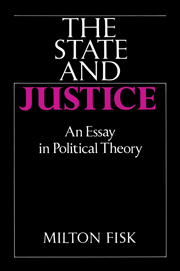Book contents
- Frontmatter
- Contents
- Preface
- Introduction: Can the state rule without justice?
- Part One An outline of a materialist political theory
- Part Two An assessment of the place of justice in the state
- Part Three A functional view of political institutions
- Part Four An account of the community of states
- Part Five A reflection on the transition to a new kind of state
- Conclusion: State, class, and democracy
- Notes
- Index
Part Five - A reflection on the transition to a new kind of state
Published online by Cambridge University Press: 06 July 2010
- Frontmatter
- Contents
- Preface
- Introduction: Can the state rule without justice?
- Part One An outline of a materialist political theory
- Part Two An assessment of the place of justice in the state
- Part Three A functional view of political institutions
- Part Four An account of the community of states
- Part Five A reflection on the transition to a new kind of state
- Conclusion: State, class, and democracy
- Notes
- Index
Summary
Contradictions gnaw at the state and are the source of changes in it. The contradiction between justice and the economy is manifest when the justice needed to make governance possible undermines the economy the state functions to promote. There is also the contradiction between state justice as publicized policy and state justice as an actual institutionalized tendency. The global justice of the imperial state is billed as a policy of peace but ends up as a tendency toward hostilities. In addition, state justice will fall short of the standards of radical justice. Specifically, the subsistence justice of the welfare state will fall short of the radical demand for egalitarian redistribution. Repression also enters into this expanding circle of conflict. State justice aspires to secure universal acceptance for the state; yet tensions between different interests make it impossible to realize this aim and necessary to use repression in order to rule. Each of these contradictions emerges within the framework of an economy that promotes or at least sustains divisions among classes, races, and sexes.
How does the state adjust to these contradictions? When, on the one hand, state justice, by answering the demands of radical justice, becomes so strong that it is undermining the economy, the state might well retreat from justice to greater repression. The ensuing struggle between social groups and the state could lead to a defeat for the existing state along with the emergence of a new form of state.
- Type
- Chapter
- Information
- The State and JusticeAn Essay in Political Theory, pp. 273 - 274Publisher: Cambridge University PressPrint publication year: 1989



